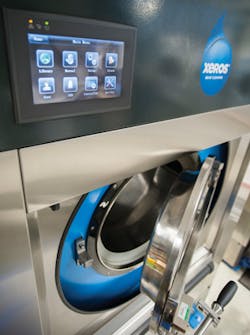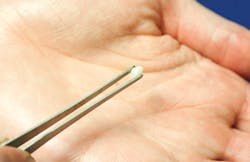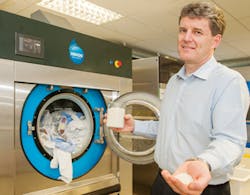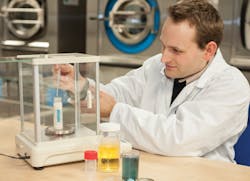Wiser Washing: New Advances in Commercial Laundry Technology Conserve Water, Energy
By Jonathan Benjamin
Water is a precious resource, but last winter's droughts in California have driven that point home in a dramatic way. California Governor Jerry Brown declared a drought emergency in mid-January, asking residents to cut back on their water use during the state's worst drought on record. Seventeen rural communities were in danger of running out of water, and drought has threatened California's $45-billion agriculture business,1 which consumes 80 percent of the state's water supply. Lost revenue from farming and related business is estimated to reach $5 billion, and to make matters worse, wildfires increased almost 50 percent as compared to 2012.2
Although residents are trying to conserve water in the short-term, dealing with this drought -- and other water crises worldwide -- will require changing long-term water usage habits. Conservation will also require policy changes from both government and industry, as well as infrastructure changes such as the two 30-mile water tunnels being proposed in California.3 In addition to conservation measures, it makes sense to look to technological advances for other ways to lower our dependency on water.
There are many ways to conserve -- from fixing leaky faucets and cutting down on watering the lawn to implementing innovative new methods of agriculture that use less water. But, the best way to conserve is to take a proactive approach. If we can use the best that technology can offer us to offset the amount of water needed in our everyday lives, we get out in front of the problem.
In the U.S., about half of total water withdrawals go to support thermoelectric power, and about a third is used for irrigation, but public-supply water is also used for a variety of other uses, such as our drinking water and for cleaning.4 Traditionally, most methods of cleaning have involved large volumes of water. Cleaning our clothes, sheets and towels requires copious water consumption -- in fact, 22 percent of indoor home water use comes from doing laundry.5 On an industrial scale, think of the impact multiplied by hundreds or thousands of people in a hotel, hospital or gym facility.
Reducing Consumption in Commercial Laundry
The tourism and hospitality industry has experienced rapid growth, and the demand for water and energy resources has exponentially increased. In fact, energy usage in hotels makes up most of their carbon footprint and is the second largest cost in most hotels after the cost of staff. As a result, hotels are increasingly adopting green practices to conserve resources, reduce their costs, gain a competitive advantage, improve customer loyalty, and increase brand value.
Driven by a concern for dwindling environmental resources, consumer demand, and potential cost savings, more and more hotels are implementing green initiatives, such as participating in the Green Key Eco-Rating Program or becoming LEED (Leadership in Energy and Environmental Design) certified.
Reducing the use of energy, water and chemicals is essential for the hospitality industry's sustainability efforts. Typically, green initiatives are something the industry struggles with because they can sometimes cost more money to implement than the traditional way of doing things. However, in the case of commercial laundry, re-examining the technological process for cleaning has resulted in a solution that delivers cleaner laundry in a greener way -- at a lower cost than traditional washing machines.
By leveraging today's technology, the hospitality industry can save water and energy and have a much more widespread impact on the environment than just asking hotel guests to reuse towels. An almost waterless commercial laundry system introduced by Xeros is based on the hydrophilic properties of polymer beads. Scientists at the University of Leeds School of Textiles discovered that tiny polymer beads -- mixed with just a small amount of water and a special detergent -- would act as a magnet for stains and dirt, cleaning laundry even better and more gently than traditional methods. Plus, these reusable beads have a lifespan of hundreds of washes before being collected and recycled back into the polymer supply chain.
By converting to a Xeros polymer bead laundry system, commercial facilities are able to highlight their commitment to the environment and advance their standing as a "green" organization while saving money at the same time. With a polymer bead system, facilities can expect to:
- use up to 80 percent less water
- use 50 percent less energy (due to lower temperatures)
- use approximately 50% less detergent (compared to conventional washing)
- deliver superior cleaning results
This innovation in commercial laundry delivers a trio of benefits: better cleaning, lower cost and a green solution. To put it into perspective, if everyone in the U.S. switched to a polymer bead cleaning system, it would save nearly 5 billion gallons of water in a year, substantially reducing our carbon footprint.
Xeros' patented polymer bead cleaning solution was named a top invention by TIME Magazine and has won a number of environmental awards, including the UK's Business Excellence award in the Cleantech category and the coveted Green Innovation awards at UK Rushlight Awards. In 2014, Xeros was named an Edison Award finalist in the Energy/Sustainability category. The company has also joined EarthShare and the Sustainable Apparel Coalition to support water and energy conservation.
Since water rate increases are expected to accelerate at double the rate of inflation over the next five years, green practices that can also save money are becoming even more important. Polymer bead cleaning can help deliver water and energy savings for a greener clean while at the same time delivering cleaner laundry. Currently, these super-efficient laundry systems are only available for the commercial market. However, a consumer model is in development and could be introduced in the next couple of years. IWW
About the Author: Jonathan Benjamin is president of Xeros, North America. For additional information, visit www.xeroscleaning.com.
References
1. Erin McClam, "California governor declares drought emergency, asks for conservation," NBC News, January 17, 2014, http://usnews.
nbcnews.com/_news/2014/01/17/22339076-california-governor-declares-drought-emergency-asks-for-conservation.
2. Jennifer Oldham and Michael B. Marois, "California Drought Impact Seen Spreading From Fires to Food Cost," Bloomberg, February 6, 2014, http://www.bloomberg.com/news/2014-02-07/california-drought-impact-seen-spreading-from-fires-to-food-cost.html
3. ibid.
4. "Water Use in the United States," nationalatlas.gov, accessed May 21, 2014, http://nationalatlas.gov/articles/water/a_wateruse.html
5. "Water Conservation Tips," National Geographic, accessed May 21, 2014, http://environment.
nationalgeographic.com/environment/freshwater/water-conservation-tips/.
Archived IWW Issues




